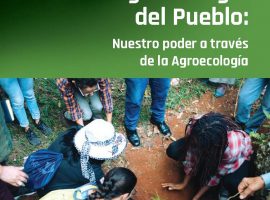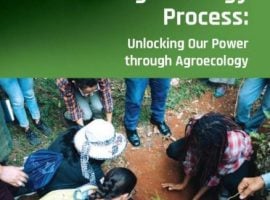 WhyHunger is proud to release its first agroecology publication, “Agroecology: Putting Food Sovereignty into Action.” Agroecology is an agricultural method based on the traditional knowledge of those who cultivate the land and a way of life. We believe its practice is critical to addressing global hunger and increasing communities’ access to basic resources such as land, water and seeds. The publication is not a technical guide to agroecology, rather it shares the knowledge and perspectives of 10 social movement leaders that are working to “scale up” agroecology around the world. It also highlights the social, political, cultural, nutritional and spiritual meanings of agroecology from within communities that have been negatively impacted by the commodification of food.
WhyHunger is proud to release its first agroecology publication, “Agroecology: Putting Food Sovereignty into Action.” Agroecology is an agricultural method based on the traditional knowledge of those who cultivate the land and a way of life. We believe its practice is critical to addressing global hunger and increasing communities’ access to basic resources such as land, water and seeds. The publication is not a technical guide to agroecology, rather it shares the knowledge and perspectives of 10 social movement leaders that are working to “scale up” agroecology around the world. It also highlights the social, political, cultural, nutritional and spiritual meanings of agroecology from within communities that have been negatively impacted by the commodification of food.
“We envision this publication will serve as a tool for popular education among grassroots organizations in the United States and abroad,” said Alison Cohen, WhyHunger’s Senior Program Director.
Throughout this publication, grassroots organizers share how the practice of agroecology can transform societies and build a sustainable food future. Though not commonly understood in food systems predominantly controlled by industrial agriculture, WhyHunger and leading social movements around the world have long viewed agroecology as a way to improve climate change and achieve food sovereignty for those facing hunger around the globe.
“Agroecology is the only way to solve the problems of hunger and the climate crisis,” said Chavannes Jean-Baptiste, Peasant Movement of Papaye (MPP) of Haiti.
By listening to the voices in this publication and gaining more insight about the collective struggle for justice around the world in the face of unsustainable farming practices, we hope there will be increased dialogue, awareness and support for the leaders and communities who are fighting to reclaim their rights and food systems.
This project was spearheaded by our Global Movements Program with the support of partners such as La Via Campesina International and the World March of Women.
Read, download and share the full publication here.





